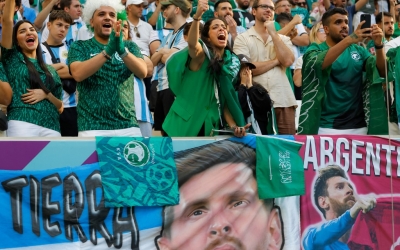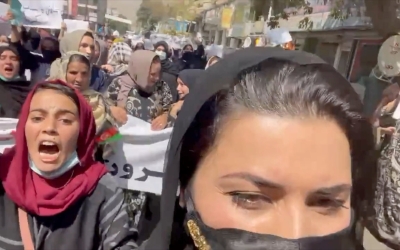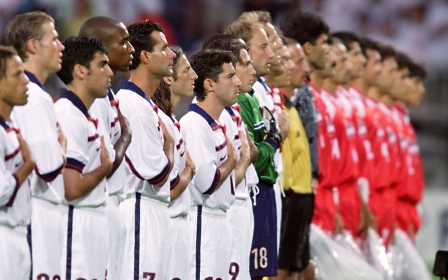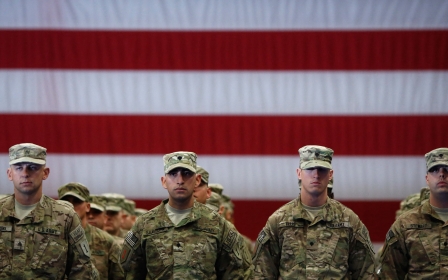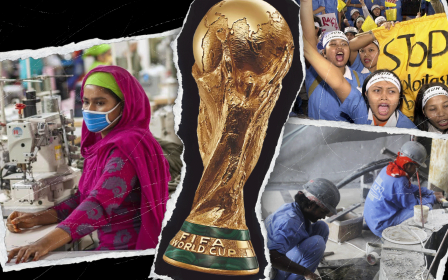World Cup 2022: For Afghans, this year's tournament is a true underdog story
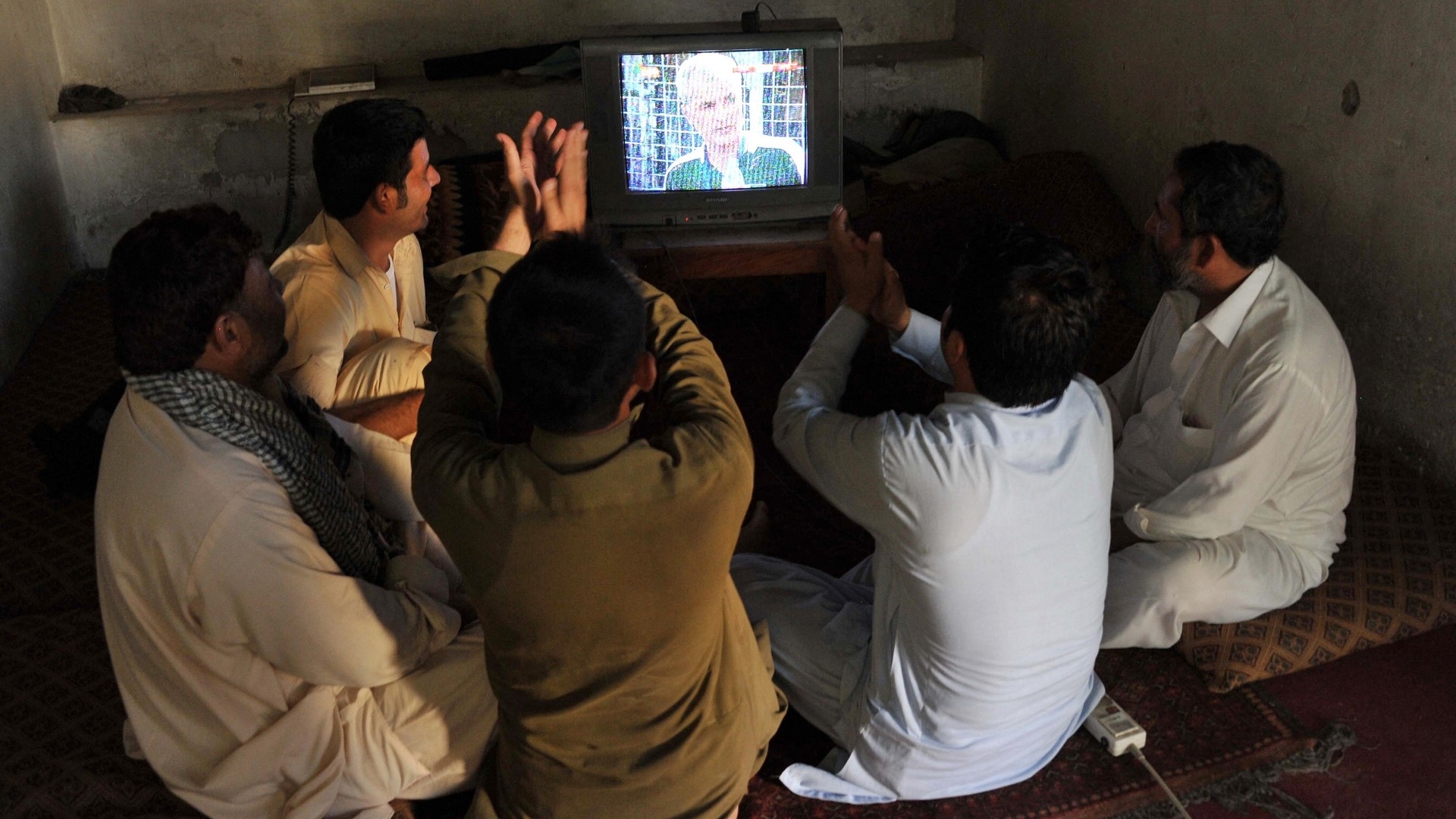
When Rohullah Rezai tuned into his first World Cup more than a decade ago, he was what many football fans would describe as a glory hunter.
"I wanted to know who had the strongest athletes, who won the most championships and who was the greatest, so I could root for them," the 22-year-old told Middle East Eye.
For years, this meant supporting Germany, a nation that has won the cup four times.
'The truth is, they [critics of Qatar] can't fathom that this side of the world has anything positive to offer'
- Rohullah Rezai, football fan
Watching the German national team lift the trophy in 2014 was especially meaningful for the Kabul native.
Not only was it a distraction from Afghanistan's highly-contested presidential election, which had dominated the nation's headlines for months, but it also proved to him that his lifelong love of all things German wouldn't be in vain.
"From the cars to the philosophers to the clothing, I was obsessed with Germany," Rezai said about his allegiance to the nation and its team.
This year, though, he's taking an entirely different approach to how he follows the tournament.
In place of stats, he's looking at the tournament from a more political level. Rather than trying to back the best, most accomplished teams, he wants to throw his support towards "underdog" teams from nations that have been long overlooked by the rest of the world.
For him, the fact that this year's World Cup is taking place in Qatar is in itself an underdog story.
Qatar facing unrelenting scrutiny
Despite being one of the wealthiest nations in the world per capita, Qatar has had to deal with 12 years of scrutiny and criticism during its journey to becoming the first Arab and Muslim-majority nation to host the tournament, Rezai said.
"From the moment it was announced that Qatar would become the host of this year's World Cup the criticism started and hasn't stopped."
The scrutiny has mostly focused on working conditions for South and East Asian workers who built the stadiums, malls and hotels needed to accommodate the more than 1.2 million visitors.
Rezai and other Afghan fans told MEE that they didn't fully know the status of workers in Qatar, but they believed the country was being overly criticised because it's a Muslim-majority nation.
Rezai said this thinking was unwarranted. He's never been to Qatar, but said that by looking at the footage of the stadiums and the shots of the capital Doha itself, he saw no shortcomings in this World Cup when compared to previous ones.
"Everything looks just as high quality as any other World Cup I've seen," he said.
The constant questions of whether or not Qatar could host the World Cup were likely coloured by a sense of Western superiority and entitlement, he said.
Racism and Islamophobia
As a graphic designer, Rezai spends a lot of time online and says that the coverage from well-known outlets like the BBC and CNN has been overwhelmingly harsh, something he says may be down to Islamophobia and Orientalism.
"The truth is, they can't fathom that this side of the world has anything positive to offer."
He points to recent online criticism of a German football pundit during a BBC interview as an example of that mindset.
In an interview on the BBC about Iran's win against Wales, Jurgen Klinsmann, the former head coach of both the US and German national teams, kept making comments about "their culture" when referring to both the Iranian players and the Guatemalan referee.
Carlos Queiroz, the head coach of the Iranian national team, issued a blistering attack against Klinsmann's comments and called on him to resign from his role on Fifa's technical study group.
Instances like this are why Rezai says he wants this World Cup to show the world that it's not just the West that should be seen as the standard-bearers for society, culture and sports in the world.
"Asia, the Middle East, the African continent, even Latin America, these are all the places that they [western nations] discount. But what they need to realise in the 21st century is that they each have as much to contribute to the world as these big western nations think they do."
World Cup fever
Like Rezai, Bashir Ayoubi has been a life-long football fan.
A fervent Real Madrid supporter, the 27-year-old said he would be supporting the Brazilian team, as its squad includes three players from the 35-time La Liga champions.
'People don't know how to feed their families, and every time they go outside they feel watched by the Taliban. Who can think about football at a time like this?'
- Rahim, taxi driver
But because the tournament has been moved to the winter to accommodate for the Arabian Gulf weather, Ayoubi said Afghan fans were having a tough time keeping up with the matches in real time.
"I wanted to watch the Argentina-Mexico match but there was no electricity all night," Ayoubi said of the hours-long blackouts Kabul residents must contend with each winter.
Luckily, though, Ayoubi says many people find a way to watch so he never feels left out. "By the morning, my friends were calling me and filling me in on everything."
Moving the games to the winter has also had an effect on local businesses in Kabul.
Workers at two Middle Eastern restaurants said that the cold Kabul winter, and the pollution that comes from tens of thousands of homes burning wood and coal to keep warm, means fewer customers were willing to venture out in the evening to watch matches at eateries that often play sporting events.
Watching at home
It's not just the weather that's stopping some from watching the games outside.
As much as there are passionate fans like Ayoubi and Rezai, others in Kabul say that the recent economic downturns coupled with the country's restrictions on social life have impacted how much they can enjoy the World Cup.
In previous years, Ayoubi would have been one of the fans heading out to a local eatery to watch the matches with friends, but he says people's finances have taken a major hit over the last year due to sanctions, banking restrictions and cutbacks on international aid following the Taliban's return to power.
All of this has led to the loss of up to 900,000 jobs and major price hikes on food, gas and other essentials.
As such, fewer people are able to splurge on nights out to watch football.
"People can't justify the expense of going out anymore, so we either get together at home to watch it or we just text each other from our own homes during the games," said Ayoubi.
Taliban-imposed restrictions
The owner of two shisha cafes in Kabul, where young people often gathered to watch sporting events, said the Taliban's recent ban on the sale of shisha in restaurants in the cities of Kabul, Kandahar and Herat has also impacted their World Cup business.
"People just aren't coming after the shisha ban," said the entrepreneur, who asked to remain anonymous fearing blowback from the Ministry for the Propagation of Virtue and the Prevention of Vice, which enforces the ban.
Rahim, a driver in his 30s who asked for only his first name to be used due to security fears, also says increasing restrictions and the poor state of the economy are keeping many people from enjoying their one-time passions, including the World Cup.
"I have a lot of friends who are diehard football fans, but even they aren't watching like they used to."
Rahim says people are too preoccupied with other things at the moment to revel even in a historic World Cup.
"People don't know how to feed their families, and every time they go outside they feel watched by the Taliban. Who can think about football at a time like this?"
Middle East Eye propose une couverture et une analyse indépendantes et incomparables du Moyen-Orient, de l’Afrique du Nord et d’autres régions du monde. Pour en savoir plus sur la reprise de ce contenu et les frais qui s’appliquent, veuillez remplir ce formulaire [en anglais]. Pour en savoir plus sur MEE, cliquez ici [en anglais].


